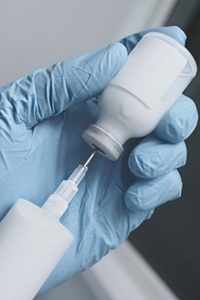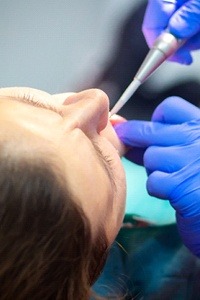IV Sedation - Prosper, TX
Offering a More Calm and Stress-Free Experience

For patients with extreme dental anxiety or who are preparing for a complex dental procedure, IV sedation is one of the safest, most effective ways to calm nerves and keep patients relaxed. More and more dentists are using this type of sedation to help individuals who may put off caring for their oral health for fear of going to the dentist. At Texas Dental Surgery, our team of professionals understands dental work can be a bit scary but by providing IV sedation, we can put you at ease and make your experience much less daunting and more relaxing. To find out if you’re a candidate for IV sedation, contact us today.
Why Choose Texas Dental Surgery for IV Sedation?
- Highly-qualified dental experts to administer sedation
- Patient comfort is a priority
- Fast-acting, safe, and effective
What is IV Sedation?

IV Sedation is administered into the bloodstream via a small injection in your hand or arm. This method is used most often on patients with extreme dental anxiety or who are undergoing extensive, complex dental procedures. Offering complete relaxation mentally and physically, it can be beneficial for patients who suffer from a sensitive gag reflex, have difficulty sitting still, or who need multiple procedures completed in one appointment.
How IV Sedation Works

When you arrive for your procedure, a small needle is used to insert a tube into the vein either on the top of your hand or in your arm. The sedation solution will flow directly into your bloodstream, and the IV will remain in your vein throughout the duration of your visit. While under sedation, you can expect our team to closely monitor your oxygen and pulse to ensure you do not have a negative reaction or issue with the sedation.
Patients who have IV sedation can expect to feel nothing from the procedure, nor will they remember much, if anything, from the visit.
How to Prepare for IV Sedation

Prior to your dental visit, it is recommended that you not eat or drink anything 8 hours before your procedure. You’ll also need to make sure someone is available to escort you to and from your dentist’s appointment, as it does take time for the effects to fully wear off.
It might also be necessary to stop taking certain medications before receiving IV sedation. All of these instructions will be provided to you when you schedule your procedure.
Who is a Good Candidate?

Although a needle is used to administer the IV, this type of sedation is ideal for individuals who have a natural fear of needles and going to the dentist. If you’re concerned about the needle used to place the tube in your vein, we can apply a topical cream to numb the area prior to inserting the tube.
IV sedation is also great if you:
- Have tried other forms of sedation and none have worked effectively
- Are having multiple procedures at one time
- Are in good overall health
- Have severe dental anxiety
What to Expect Afterwards

Once the procedure is complete, your sedation dentist will remove the IV from your hand or arm. You can expect to feel drowsy with the medication taking anywhere from 24-48 hours to fully wear off. You may also have dry mouth as a result of your mouth remaining open throughout your procedure. It’s also likely that dry mouth will occur if you required any gauze to be placed into your mouth after surgery.
Although not all patients are the same and some will experience certain side effects that others do not, nausea, vomiting, headaches, and amnesia are all possible after receiving IV sedation.
IV Sedation FAQs
Do you believe that you could benefit from IV sedation? If so, we are ready to welcome you in for a sedation dentistry consultation. Before you schedule your appointment, however, you may want to learn more about what to expect from this form of sedation. That is why we have put together the following list of frequently asked questions. If you do not see the answer to your specific question, you are welcome to contact us directly.
Will IV Sedation Put Me to Sleep?
The type of IV sedation we use is different from general anesthesia (which is designed to produce a state of total unawareness). You might drift off to sleep while you are under the influence of IV sedation, but you will not be totally unconscious. That is to say, you should remain alert enough to respond to directions and questions from our dental team. If you do doze off, it will be easy for us to awaken you with a gentle shake.
What Types of Procedures Is IV Sedation Used For?
While milder forms of sedation might be used for virtually any dental procedure, we are more exclusive in our use of IV sedation. Prior to your oral surgery, we will evaluate your medical history, discuss your needs, and determine the type of sedation that is the best fit for your unique circumstances.
What Type of Medication Is Used for IV Sedation?
The most common class of medications used in IV sedation are benzodiazepines. These drugs work by temporarily increasing the effects of a brain chemical called gamma amino butyric acid (GABA). GABA reduces the processes in the brain that are responsible for anxiety and arousal. Hence, you should enjoy a state of deep relaxation while you are being sedated via benzodiazepines.
Are There Any Serious Risks Associated with IV Sedation?
The risks associated with IV sedation are minimal. Prior to approving you for it, we will take a thorough medical history to assess the risk that you will suffer serious side effects. If you are in a high-risk group, we may explore different ways of making you comfortable. During your procedure, we’ll keep a close eye on your breathing and other vital statistics. After you go home, be sure to give us a call if you have any concerns about how the lingering sedation is affecting you. Your safety is always our top priority!

